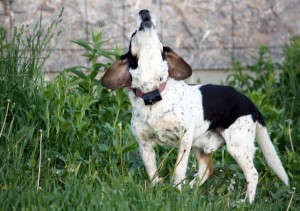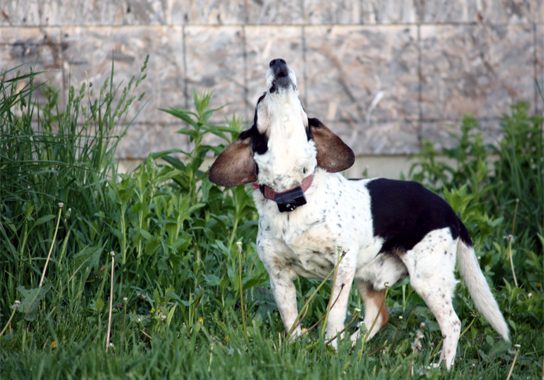Owners are best caregivers for animals
By Dr. Rebekah Frost

Dutch has an electronic fence collar.
With social media readily available, many times things get blown out of proportion as more and more people comment and very easily share their opinions on certain matters. Sometimes these opinions are very emotionally driven especially when it comes to animals. As a veterinarian I try to see things from all sides and would like to state the importance of looking at the whole picture and doing your research before you write something you may regret on social media.
Just recently there has been an outcry against the Dunkirk dog holding center for stray dogs. Of course there may always be a need for updates and improvements for a center like this, but people are creating a huge uproar against the city of Dunkirk for not caring for these dogs properly.
The focus is being put in the wrong areas. Here are my suggestions when it comes to properly caring for these pets in light of these recent accusations:
1. KEEP YOUR DOGS CONTAINED: If you want a pet, you must be responsible for that pet. First of all when adopting a dog, do your research on the breed of dog. Some dogs are more prone to running away and escaping the first chance they can get. You must have some form of containment for that dog and understand what is required by local laws. Some towns require a certain height of fencing based on what breed of dog you own. Always keep your dog on a leash when walking them. This will prevent fights with other dogs and the possibility of your pet running off. We keep our dogs contained by using an invisible fence system. We have about 3 acres of land fenced and this not only allows our dogs to be with us at all times, but it gives them exercise and keeps them safe from our busy road. Keeping your pet properly contained will keep them away from your town holding centers and shelters.
2. FOLLOW YOUR COUNTY AND TOWN LAWS: In New York state, it is the law that every cat, dog, and ferret receives a Rabies vaccine every three years following the first one year booster. Each town also has its licensing laws. If you follow your town’s requirements, they then have a record of your pet on file if your pet does become lost. Also most towns in our area have a required “leash law” and you can be fined if your pet is found to be wandering off your property.
3. SPAY AND NEUTER YOUR PETS: Spaying and especially neutering your pets will take away that desire your pet has to roam and find a mate. Spaying and neutering also will alleviate many health issues like breast cancer and testicular cancer. In fact the majority of dogs that stray and that also are hit by cars are un-neutered male dogs.
4. IDENTIFY YOUR PET: Secure your dog’s license and Rabies tag to your dog’s collar or have your pet microchipped. A microchip will permanently link your pet to your name. If your pet happens to get lost, most shelters and veterinary clinics have a universal chip reader and they can release your pet immediately to you once identified.
Finally, use social media for good! If your pet is lost, there are many sites that you can post pictures of your dog that can be shared multiple times and reach many people who may help find your pet. Chautauqua Missing Pet Alert is an example on Facebookw that allows people to post lost and found pets and has very quickly reunited many owners with their lost pets before they are taken to a holding center or a shelter!
We have seen many cases where a lost pet will be driven from one county to the next, so make sure you look beyond our county in shelters and holding centers if you have a lost pet. Above all take responsibility for your pet! We are entrusted to care for our pets and the discussion above is just one part of proper pet care and ownership responsibility.

